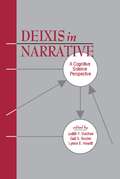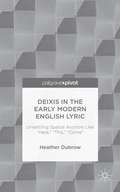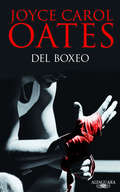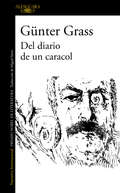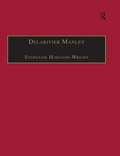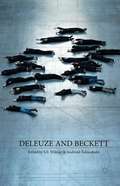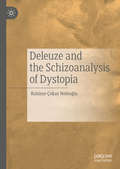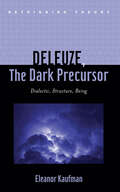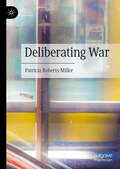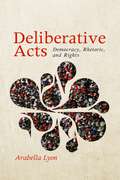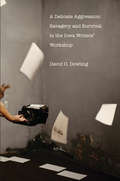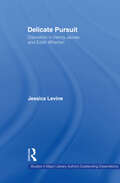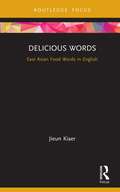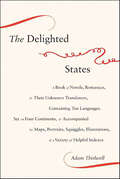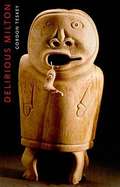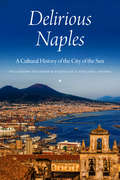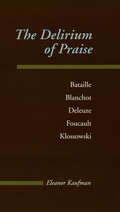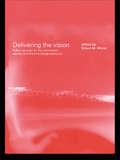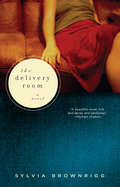- Table View
- List View
Deixis in Narrative: A Cognitive Science Perspective
by Judith F. Duchan Gail A. Bruder Lynne E. HewittThis volume describes the theoretical and empirical results of a seven year collaborative effort of cognitive scientists to develop a computational model for narrative understanding. Disciplines represented include artificial intelligence, cognitive psychology, communicative disorders, education, English, geography, linguistics, and philosophy. The book argues for an organized representational system -- a Deictic Center (DC) -- which is constructed by readers from language in a text combined with their world knowledge. As readers approach a new text they need to gather and maintain information about who the participants are and where and when the events take place. This information plays a central role in understanding the narrative. The editors claim that readers maintain this information without explicit textual reminders by including it in their mental model of the story world. Because of the centrality of the temporal, spatial, and character information in narratives, they developed their notion of a DC as a crucial part of the reader's mental model of the narrative. The events that carry the temporal and spatial core of the narrative are linguistically and conceptually constrained according to certain principles that can be relatively well defined. A narrative obviously unfolds one word, or one sentence, at a time. This volume suggests that cognitively a narrative usually unfolds one place and time at a time. This spatio-temporal location functions as part of the DC of the narrative. It is the "here" and "now" of the reader's "mind's eye" in the world of the story. Organized into seven parts, this book describes the goal of the cognitive science project resulting in this volume, the methodological approaches taken, and the history of the collaborative effort. It provides a historical and theoretical background underlying the DC theory, including discussions of deixis in language and the nature of fiction. It goes on to outline the computational framework and how it is used to represent deixis in narrative, and details the linguistic devices implicated in the DC theory. Other subjects covered include: crosslinguistic indicators of subjectivity, psychological investigations of the use of deixis by children and adults as they process narratives, conversation, direction giving, implications for emerging literacy, and a narrator's experience in writing a short story.
Deixis in the Early Modern English Lyric: Unsettling Spatial Anchors Like Here, This, Come
by Heather DubrowThis book engages with deictics ('pointing' words like here/there, this/that) of space. It focuses on texts by Donne, Shakespeare, Spenser, and Wroth in particular, relating their forms of deixis to cultural and generic developments; but it also suggests parallels with both iconic and neglected texts from a range of later historical periods.
Del
by Barbara W. MakarA systematic, phonics-based early reading program that includes: the most practice for every skill, decodable readers for every skill, and reinforcement materials--help struggling students succeed in the regular classroom
Del boxeo
by Joyce Carol Oates«Si no se puede golpear, por lo menos se puede ser golpeado, y saber que todavía se está vivo.» Del boxeo es un ensayo sencillo, dramático y de una profundidad evocadora. Te golpea convirtiendo tus recuerdos en jumps, ganchos o rectos de derecha. Te coloca en una posición en donde la insensibilidad solo te convierte en una cosa: un boxeador. Un ensayo donde la exitosa novelista estadounidense vierte certeras reflexiones sobre ser pobre y obstinado, sobre la necesidad de crear héroes y saber triunfar, llevando su mirada y conduciendo la nuestra hacia las raíces del boxeo, aportado singulares puntos de vista sobre un tema del cual escribieron autores como Ernest Hemingway o Mark Twain: el boxeo como metáfora, como espectáculo e historia, el boxeo visto por la literatura, el cine y las mujeres. «El boxeo es una celebración de la religión perdida de la masculinidad, tanto más contundente por estar perdida.» ** Premio Ja! Bilbao por el «modernísimo humor negro» de su obra. La crítica ha dicho...«La Sra. Oates lleva al boxeo la misma inteligencia que aplica a su ficción, con su lucha humana, sus combates íntimos en público, sus decepciones, sus triunfos y fracasos de la voluntad.»The New York Times
Del diario de un caracol
by Günter GrassUno de los textos más personales del Premio Nobel alemán. Ideado como un diario de la campaña electoral que realizó en 1969 a favor de la candidatura de Willy Brandt, trasciende por su complejidad la mera anécdota política, para instalarse entre el ensayo y la prosa poética. En 1969, Günter Grass participa en la campaña electoral a favor del Partido Socialista de Alemania y, muy especialmente, de su amigo Willy Brandt. El diario de su gira le sirve luego para escribir un libro en el que las fronteras entre narrativa, política y autobiografía se confunden. El autor se dirige a sus cuatro hijos -y, así, a las nuevas generaciones alemanas- para hablarles de la democracia y de los horrores del Tercer Reich. Y crea una historia: la del profesor de instituto Hermann Ott, llamado «Zweifel» (duda), que apoyó a los judíos de Dánzig durante su persecución y expulsión. Para Grass, el riesgo está siempre en los extremos. El simbolismo político del caracol resulta claro: en la historia del progreso no hay saltos sino un lento deslizarse hacia adelante, y desde esa idea lucha contra quien pretenden sobrepasarlo por la izquierda o la derecha. «Sólo quien se ha sentado en una vacía concha de caracol y ha vivido en el lado de sombra de la Utopía puede medir el progreso.»
Delarivier Manley: Printed Writings 1641–1700: Series II, Part Three, Volume 12 (The Early Modern Englishwoman: A Facsimile Library of Essential Works & Printed Writings, 1641-1700: Series II, Part Three #Vol. 12)
by Stephanie Hodgson-WrightThe works included in this volume constitute Delarivier Manley's early oeuvre, written in the seventeenth century. They comprise one epistolary novella, Letters Written [sic] by Mrs Manley; one commendatory poem 'To the Author of Agnes de Castro'; one comedy, The Lost Lover, or The Jealous Husband, one tragedy, The Royal Mischief; and two commemorative poems, 'Melpomeme: The Tragick Muse' and 'Thalia: The Comick Muse'. In the light of new readings of Delarivier Manley's early work, this volume demonstrates her important contribution to the literary and theatrical milieu of the late seventeenth century.
Deleuze and Beckett
by S. E. Wilmer Audronė ŽukauskaitėDeleuze and Beckett is a collection of essays illuminating similarities between the philosophies and practices of Deleuze and Beckett. The contributors include some of the leading Beckett and Deleuze specialists in the world, and their essays address different ideas and concepts of Deleuzian philosophy as well as a wide range of Beckett's oeuvre, including his novels, short stories, stage and television plays, and film work. The book considers Deleuze's interpretation of Beckett's work anddemonstrates that Deleuzian concepts and ideas can be usefully applied to Beckett's texts in order provide a greater understanding of Beckett's characters and their journeys. Deleuze's philosophy helps us to recognize that what has been seen as the private territory of despair, loneliness, and emptiness in Beckett's work masks a world of flow and fluctuation that expresses multiple and heterogeneous possibilities.
Deleuze and the Schizoanalysis of Dystopia
by Rahime Çokay NebioğluThis book offers an insightful history of dystopian literature, integrating it within the conceptual schemas of Deleuze and Guattari. Unlike earlier examples of dystopia which depict representations of a possible future that is remarkably worse than present society, contemporary dystopia often tends to portray an almost allegorical re-presentation of present society. Tracing dystopia’s shift from transcendence towards immanence with the rise of late neoliberal capitalism and control-societies, Çokay Nebioğlu skilfully constructs a new taxonomy of dystopian fiction to address this changing dynamic. Accompanied by a subtle exploration of earlier and later examples of the genre by George Orwell, Aldous Huxley, Suzanne Collins, Veronica Roth, William Gibson, Max Barry, Dave Eggers, Cindy Pon, and Tahsin Yücel along with rich and nuanced analysis of China Mieville’s Perdido Street Station and Margaret Atwood’s MaddAddam trilogy, the book seeks not only to track the transformation of dystopia in light of worldwide cultural, political and economic transformation, but also to conduct a schizoanalytic reading of dystopia, thus opening up an exciting field of enquiry for Deleuzian scholars.
Deleuze, The Dark Precursor: Dialectic, Structure, Being (Rethinking Theory)
by Eleanor KaufmanA thoughtful and original analysis of the writings of influential French philosopher Gilles Deleuze.Gilles Deleuze is considered one of the most important French philosophers of the twentieth century. Eleanor Kaufman situates Deleuze in relation to others of his generation, such as Jean-Paul Sartre, Pierre Klossowski, Maurice Blanchot, and Claude Lévi-Strauss, and she engages the provocative readings of Deleuze by Alain Badiou and Slavoj Žižek.Deleuze, The Dark Precursor is organized around three themes that critically overlap: dialectic, structure, and being. Kaufman argues that Deleuze's work is deeply concerned with these concepts, even when he advocates for the seemingly opposite notions of univocity, nonsense, and becoming. By drawing on scholastic thought and reading somewhat against the grain, Kaufman suggests that these often-maligned themes allow for a nuanced, even positive reflection on apparently negative states of being, such as extreme inertia. This attention to the negative or minor category has implications that extend beyond philosophy and into feminist theory, film, American studies, anthropology, and architecture.
Deliberating War
by Patricia Roberts-MillerThis book argues that treating politics as war derails essential democratic processes, including deliberation and policy argumentation, in complicated ways. “Politics is war” is not always just a figure of speech, but often a sincere expression of how people see disagreement—they mean it literally—and they use it to evade the responsibilities of rhetoric. This book takes the metaphor seriously. Using a series of case studies ranging from the 432 BCE “Debate at Sparta” to Bill O’Reilly’s recent invention of a “War on Christmas,” Deliberating War illustrates pathologies of deliberation that arise when a community understands itself to be at political war. This book identifies recurrent rhetorical strategies that constrain or even effectively prohibit deliberation, such as deflecting, reframing, threat inflation, appealing to paired terms, claiming moral license, radicalizing a base. In short, what seems to be an effective solution to an immediate rhetorical problem—using hyperbole and demagoguery to persuade people to adopt a specific leader or policy—is a trap that prevents democratic practices of compromise, deliberation, fairness, reciprocity. Unhappily, threat inflation—even when well-intentioned--At some point, hyperbolic rhetoric becomes threat inflation, and then that inflated threat becomes the premise of policies, both foreign and domestic. And then agreeing as to the obvious existential threat posed by the Other and uniting behind the obvious policy solution is a necessary sign of being on the side of Good. Once communities become persuaded that they are in an apocalyptic battle between Good and Evil, politics as war can quickly become real war—often with far-reaching and catastrophic consequences.
Deliberative Acts: Democracy, Rhetoric, and Rights (Rhetoric and Democratic Deliberation #7)
by Arabella LyonThe twenty-first century is characterized by the global circulation of cultures, norms, representations, discourses, and human rights claims; the arising conflicts require innovative understandings of decision making. Deliberative Acts develops a new, cogent theory of performative deliberation. Rather than conceiving deliberation within the familiar frameworks of persuasion, identification, or procedural democracy, it privileges speech acts and bodily enactments that constitute deliberation itself, reorienting deliberative theory toward the initiating moment of recognition, a moment in which interlocutors are positioned in relationship to each other and so may begin to construct a new lifeworld. By approaching human rights not as norms or laws, but as deliberative acts, Lyon conceives rights as relationships among people and as ongoing political and historical projects developing communal norms through global and cross-cultural interactions.
Deliberative Acts: Democracy, Rhetoric, and Rights (Rhetoric and Democratic Deliberation)
by Arabella LyonThe twenty-first century is characterized by the global circulation of cultures, norms, representations, discourses, and human rights claims; the arising conflicts require innovative understandings of decision making. Deliberative Acts develops a new, cogent theory of performative deliberation. Rather than conceiving deliberation within the familiar frameworks of persuasion, identification, or procedural democracy, it privileges speech acts and bodily enactments that constitute deliberation itself, reorienting deliberative theory toward the initiating moment of recognition, a moment in which interlocutors are positioned in relationship to each other and so may begin to construct a new lifeworld. By approaching human rights not as norms or laws, but as deliberative acts, Lyon conceives rights as relationships among people and as ongoing political and historical projects developing communal norms through global and cross-cultural interactions.
A Delicate Aggression: Savagery and Survival in the Iowa Writers' Workshop
by David O. DowlingA vibrant history of the renowned and often controversial Iowa Writers’ Workshop and its celebrated alumni and faculty As the world’s preeminent creative writing program, the Iowa Writers’ Workshop has produced an astonishing number of distinguished writers and poets since its establishment in 1936. Its alumni and faculty include twenty-eight Pulitzer Prize winners, six U.S. poet laureates, and numerous National Book Award winners. This volume follows the program from its rise to prominence in the early 1940s under director Paul Engle, who promoted the “workshop” method of classroom peer criticism. Meant to simulate the rigors of editorial and critical scrutiny in the publishing industry, this educational style created an environment of both competition and community, cooperation and rivalry. Focusing on some of the exceptional authors who have participated in the program—such as Flannery O’Connor, Dylan Thomas, Kurt Vonnegut, Jane Smiley, Sandra Cisneros, T. C. Boyle, and Marilynne Robinson—David Dowling examines how the Iowa Writers’ Workshop has shaped professional authorship, publishing industries, and the course of American literature.
Delicate Pursuit: Discretion in Henry James and Edith Wharton (Studies in Major Literary Authors #13)
by Jessica LevineFirst published in 2002. Routledge is an imprint of Taylor & Francis, an informa company.
Delicious Words: East Asian Food Words in English
by Jieun KiaerAs societies across the globe are becoming increasingly interwoven at an unprecedented speed and across an impressive scope, so too is the world of food, allowing the English language to develop an ever-widening culinary vocabulary. This book examines the lives of such words in today’s discourse on eating and drinking, focusing on foreign - particularly East Asian - influences on culinary terms in English, and how words are born and evolve in a modern transcultural environment. Through the lens of culinary words, this book demonstrates that foreign-origin and hybrid words, previously considered marginal, have become a main source of new imports into our daily lexicon. With case studies from Japan to Mongolia, Hong Kong to Korea, China to Vietnam, and beyond, this book examines how more and more words are becoming borderless and forming their own new global identities. By showcasing some lesser-known regional cuisines, alongside staple dishes that many of us already know and love, this book offers a wide range of examples in order to illustrate the metamorphosis of the manner in which we engage with food words. This book will be of interest to general readers, as well as those who are engaged in East Asian studies, English linguistics, intercultural communication studies, translation studies, and lexicography.
The Delighted States
by Adam ThirlwellHaving slept with a prostitute in Egypt, a young French novelist named Gustave Flaubert at last abandons sentimentality and begins to write. He influences the obscure French writer Édouard Dujardin, who is read by James Joyce on the train to Trieste, where he will teach English to the Italian novelist Italo Svevo. Back in Paris, Joyce asks Svevo to deliver a suitcase containing notes for Ulysses, a novel that will be viscerated by the expat Gertrude Stein, whose first published story is based on one by Flaubert.This carousel of influence shows how translation and emigration lead to a new and true history of the novel. We devour novels in translation while believing that style does not translate. But the history of the novel is the history of style. The Delighted States attempts to solve this conundrum while mapping an imaginary country, a country of readers: the Delighted States.This book is a provocation, a box of tricks, a bedside travel book; it is also a work of startling intelligence and originality from one of our finest young writers.
Delights
by J. David Cooper John J. Pikulski David J. Chard Gilbert Garcia Claude Goldenberg Phyllis Hunter Marjorie Y. Lipson Shane Templeton Sheila Valencia Maryellen VogtNIMAC-sourced textbook
Delirious Milton: The Fate of the Poet in Modernity
by Gordon TeskeyComposed after the collapse of his political hopes, Milton's great poems Paradise Lost, Paradise Regained, and Samson Agonistes are an effort to understand what it means to be a poet on the threshold of a post-theological world. The argument of Delirious Milton, inspired in part by the architectural theorist Rem Koolhaas's Delirious New York, is that Milton's creative power is drawn from a rift at the center of his consciousness over the question of creation itself. This rift forces the poet to oscillate deliriously between two incompatible perspectives, at once affirming and denying the presence of spirit in what he creates. From one perspective the act of creation is centered in God and the purpose of art is to imitate and praise the Creator. From the other perspective the act of creation is centered in the human, in the built environment of the modern world. The oscillation itself, continually affirming and negating the presence of spirit, of a force beyond the human, is what Gordon Teskey means by delirium. He concludes that the modern artist, far from being characterized by what Benjamin (after Baudelaire) called "loss of the aura," is invested, as never before, with a shamanistic spiritual power that is mediated through art.
Delirious Naples: A Cultural History of the City of the Sun
by Pellegrino D'Acierno Stanislao G. Pugliese Theresa Aiello B. Amore Andrea Baldi Angelo Cannavacciuolo Joseph Connors Rose DeAngelis Erri De Luca John Domini Valerio Caprara Simona Frasca Jonathan Galassi Fred Gardaphe Patrizia La Trecchia Ilaria Marchesi Simone Marchesi Nick Napoli Salvatore Napolitano Jason Pine Joseph Rescigno Gabriella Romani Gioia Timpanelli Terrence Ward Robert Zweig Francesco Durante Gregory Pell Charles Sant'EliaThis book is addressed to “lovers of paradoxes” and we have done our utmost to assemble a stellar cast of Neapolitan and American scholars, intellectuals, and artists/writers who are strong and open-minded enough to wrestle with and illuminate the paradoxes through which Naples presents itself. Naples is a mysterious metropolis. Difficult to understand, it is an enigma to outsiders, and also to the Neapolitans themselves. Its very impenetrableness is what makes it so deliriously and irresistibly attractive. The essays attempt to give some hints to the answer of the enigma, without parsing it into neat scholastic formulas. In doing this, the book will be an important means of opening Naples to students, scholars and members of the community at large who are engaged in “identity-work.” A primary goal has been to establish a dialogue with leading Neapolitan intellectuals and artists, and, ultimately, ensure that the “deliriously Neapolitan” dance continues.
The Delirium of Praise: Bataille, Blanchot, Deleuze, Foucault, Klossowski (Parallax: Re-visions of Culture and Society)
by Eleanor KaufmanThe laudatory essay, in which one author praises the work of another, is frequently characterized as an unimportant, even uncritical mode of writing. But as Eleanor Kaufman argues in The Delirium of Praise, this mode of exchange is serious and substantial enough to merit scholarly attention. By not conforming to standard practices of critical discourse, laudatory essays give new status to supposedly inferior forms of communication and states of being—including chatter, silence, sickness, imbalance, and absence of work—and emphasize affective states or emotions such as joy, friendship, and longing.The Delirium of Praise examines a group of five twentieth-century French intellectuals—Georges Bataille, Maurice Blanchot, Michel Foucault, Gilles Deleuze, and Pierre Klossowski—and their laudatory essays about each other. Structured as a circular series of exchanges, the book examines pairings of two thinkers with respect to a given theme. The exchange between Bataille and Blanchot takes up the themes of chatter and silence with regard to the novelist Louis-René des Forêts; the Blanchot-Foucault exchange explores friendship and impersonality through the lens of Jacques Derrida; the Foucault-Deleuze exchange considers "absence of work" (désoeuvrement) and the obscure French philosopher Jacques Martin; the Deleuze-Klossowski exchange revolves around the question of the sick body and the person of Nietzsche; and the final exchange between Klossowski and Bataille focuses on imbalanced economies and the writings of the Marquis de Sade. Where the praise is most excessive, approaching delirium, Kaufman locates a powerful thought-energy that pushes the laudatory essay to its limits. In her conclusion, she presents this unique mode of thought exchange as a form of intellectual hospitality.Kaufman uncovers a suspension of subjectivity, of personality, even of place and time, that is both articulated in the laudatory essays and enacted by them. Her examination of this neglected mode as practiced by five important French thinkers offers a unique perspective on twentieth-century intellectual history.
Delivering the Vision: Public Services for the Information Society and the Knowledge Economy
by Eileen M. MilnerPolitical rhetoric surrounding the role of information and knowledge in society in the twenty-first century is often thrown into sharp relief by the realities of practice. Delivering the Vision explores the way in which public service visions have developed globally and how successful they have been in contributing to major social and economic change.This edited text contains a range of case studies from the United Kingdom, the Republic of Ireland, Canada, the USA and Australia. Contributors focus both on those factors critical to success and on reasons for failure, but a common theme to emerge across all contributions is the requirement for a clear political vision, commitment and leadership if the shift from traditional forms of social and economic organisation to high-value, knowledge-intensive economies is to be safely negotiated. At the same time, individual case studies provide valuable blueprints for successful implementation of an ambitious public service change agenda.Delivering the Vision is accessible and relevant to all those interested in the management and reform of public sector organisations. It is a companion volume to the editor's earlier text Managing Information and Knowledge in the Public Sector (Routlegde: 2000)
The Delivery Room: A Novel
by Sylvia BrownriggIt is 1998. In the safe haven of her London office—a room her husband jokingly calls "The Delivery Room"—therapist Mira Braverman listens to the stories of her troubled patients, including an aristocratic woman going through an intense infertility drama, an American journalist who is eager to have a baby, and an irritable divorcé who likes to taunt Mira about her Serbian nationality. As the novel unfolds, Mira discovers she is not as distant from her patients' pain as she might once have been: her husband Peter struggles with illness, NATO's threats against her country grow more serious, and submerged truths from her own past seem likely to erupt.Compelling, complex, and always deeply human, The Delivery Room is an engaging examination of the incomplete understandings that course between therapist and patient, and a set of variations on the theme of motherhood—as well as a timely meditation on the meanings of wars fought from a distance, when ordinary citizens have to measure their personal griefs against the outrages experienced by those under attack.
